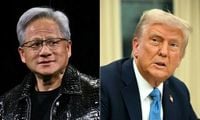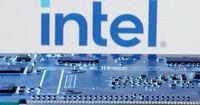Nvidia, a leading player in the artificial intelligence (AI) chip market, has announced it will incur a staggering $5.5 billion in costs due to canceled orders for its H20 chip, which has recently come under scrutiny by the U.S. government. This development follows the government's requirement for a license to export the H20 chip to China, a move that has significant implications for the tech giant.
On April 15, 2025, Nvidia revealed its expected financial hit during a challenging fiscal first quarter, as the restrictions imposed by the U.S. government have raised concerns among analysts and investors alike. "The U.S. government instructs American businesses on what they can sell and where—we follow the government's directions to the letter," an Nvidia representative stated, reflecting the company's commitment to compliance amidst increasing regulatory pressures.
The H20 chip was introduced by Nvidia after the Biden administration placed restrictions on AI chip exports in 2022. However, the recent actions by the House Select Committee on the Chinese Communist Party have intensified scrutiny of the company's sales practices. The committee opened an investigation into Nvidia's sales on April 16, 2025, amid allegations that the sale of H20 chips over the past year was effectively a "loophole" in the export regulations.
Nvidia's stock plummeted nearly 7% on the same day, closing at $104.49, as fears grew that the new export curbs would have a lasting impact on the company’s operations. Morgan Stanley analysts have trimmed their revenue projections for Nvidia, indicating that they expect an 8% to 9% hit to the company's data center revenues in the upcoming quarters due to the new restrictions. They estimate that the H20 chip accounted for approximately 12% to 13% of Nvidia's data center revenue in April.
Meanwhile, the company has highlighted its contributions to the U.S. economy, emphasizing its role in job creation and tax revenue generation. Nvidia stated, "NVIDIA protects and enhances national security by creating U.S. jobs and infrastructure, promoting U.S. technology leadership, bringing billions of dollars of tax revenue to the U.S. treasury, and alleviating the massive U.S. trade deficit." This statement aims to counterbalance the negative perceptions surrounding its operations in light of the recent investigations.
In a related development, Intel, another major American chipmaker, has also informed its Chinese clients that it will require licenses to export certain advanced AI processors. This requirement applies to chips with specific bandwidth capabilities, underscoring the tightening restrictions affecting the semiconductor industry. Intel's Gaudi series, similar to Nvidia's H20, exceeds the new regulatory thresholds, further complicating the landscape for U.S. tech companies.
Intel's shares fell over 3% on April 16, 2025, as the broader AI chip trade begins to lose momentum following a two-year rally. The ripple effects of recent trade policies under President Donald Trump have created uncertainty in the semiconductor market, prompting concerns about the future of AI technology exports.
As the investigations into Nvidia and the tightening of export regulations continue, the tech industry is bracing for potential disruptions. The House Select Committee is particularly interested in the relationship between Nvidia and Chinese AI startup DeepSeek, which has reportedly utilized Nvidia chips to develop competitive AI models. This partnership has raised alarms about national security and the implications of U.S. technology being used by foreign entities.
Industry analysts have expressed mixed sentiments regarding Nvidia's future. While the immediate outlook appears grim due to export restrictions, some maintain a bullish perspective on the company's long-term potential. Morgan Stanley has reiterated its price target for Nvidia stock at $162, citing growing demand for AI hardware as a positive indicator for the company's recovery.
Bank of America has also expressed confidence in Nvidia, maintaining a price target of $160, emphasizing the chipmaker's ability to capitalize on the increasing global demand for its products. Despite the current challenges, these analysts believe that Nvidia's market position will enable it to rebound as the AI sector continues to expand.
The situation remains fluid as Nvidia navigates the complex regulatory environment and addresses the concerns raised by lawmakers. The company's commitment to compliance and its emphasis on the economic benefits it provides to the U.S. may play a crucial role in shaping its future amidst these challenges.
As the investigation unfolds and further developments arise, stakeholders within the tech industry will be closely monitoring the implications of these export regulations on Nvidia and its competitors. The outcome could significantly influence the trajectory of the AI chip market and the broader landscape of international trade in technology.






